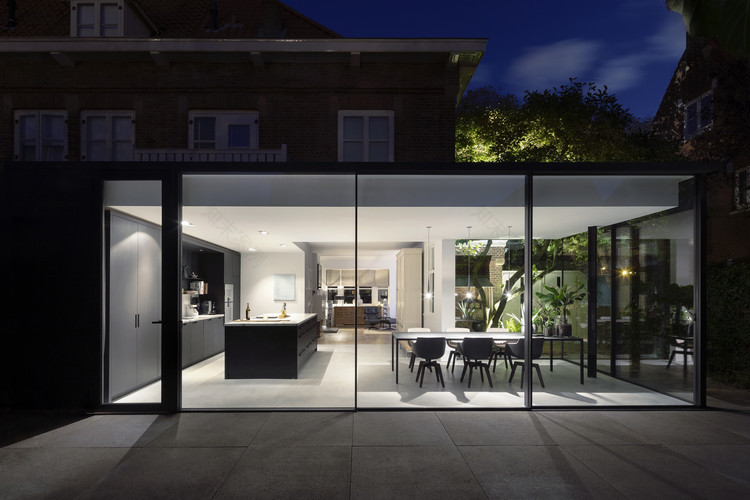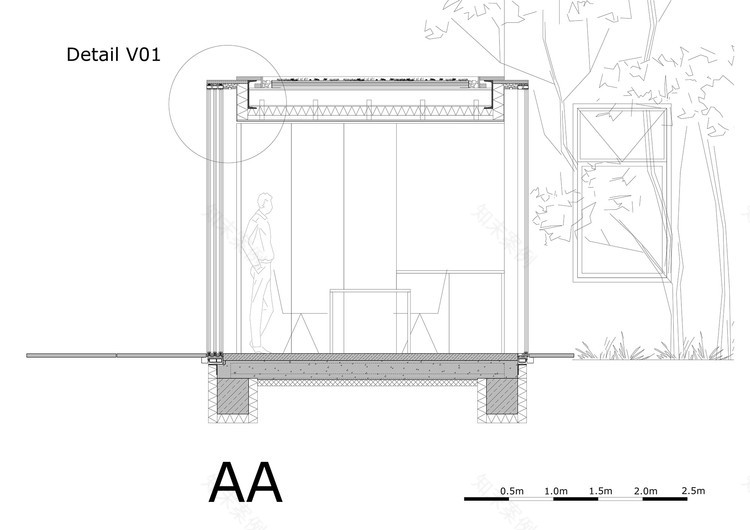查看完整案例


收藏

下载
© Christian Van Der Kooy
C.Christian Van Der Kooy
架构师提供的文本描述。在荷兰海牙的Vogelwijk区,极简主义的房屋扩建与1927年房屋的表现性砖墙建筑形成了鲜明的对比,暴露了隐藏的特质。
Text description provided by the architects. In The Hague’s Vogelwijk district in The Netherlands, a minimalist house extension contrasts sharply with the expressive brick architecture of a 1927’s house, exposing the hidden qualities.
Text description provided by the architects. In The Hague’s Vogelwijk district in The Netherlands, a minimalist house extension contrasts sharply with the expressive brick architecture of a 1927’s house, exposing the hidden qualities.
© Christian Van Der Kooy
C.Christian Van Der Kooy
Concept Scheme
概念方案
© Christian Van Der Kooy
C.Christian Van Der Kooy
房子的前侧有一个原来的附件,后面有一棵美丽的无花果树,从老房子里看不见。由于新的扩建超出了房屋的现有宽度,因此玻璃延伸部分与现有的附件有关系。这创造了一个半封闭的室外空间周围的老无花果树。通过扩大扩展范围,在隐藏的无花果树周围出现了一个第三世界,与旧世界和新世界并驾齐驱。
The house has an original annex at the front side with behind it a beautiful fig tree in the garden that was not visible from inside the old house. Because the new extension extends beyond the existing width of the house, the glass extension is going into a relationship with the existing annex. This creates a semi-enclosed outdoor space around the old fig tree. By widening the extension, a third world arises around the hidden fig tree alongside the old and the new world.
The house has an original annex at the front side with behind it a beautiful fig tree in the garden that was not visible from inside the old house. Because the new extension extends beyond the existing width of the house, the glass extension is going into a relationship with the existing annex. This creates a semi-enclosed outdoor space around the old fig tree. By widening the extension, a third world arises around the hidden fig tree alongside the old and the new world.
© Christian Van Der Kooy
C.Christian Van Der Kooy
Ground floor plan
© Christian Van Der Kooy
C.Christian Van Der Kooy
房子延伸的设计在强烈的对比和它与房子现有的“隐藏”品质之间的关系之间保持着平衡。
The design for the extension of the house balances between a sharp contrast and the relationship it has with the existing 'hidden' qualities of the house.
The design for the extension of the house balances between a sharp contrast and the relationship it has with the existing 'hidden' qualities of the house.
© Christian Van Der Kooy
C.Christian Van Der Kooy
现存的建筑,从1927年开始,有新艺术和阿姆斯特丹学派的元素。新的添加增加了一个鲜明的对比,表现砖建筑通过极简的细节。全玻璃外墙有一个最小的屋顶平台和玻璃,一直延伸到花园的水平。从内部看,几乎没有外部的视觉障碍,视图和日光可以自由发挥。扩建的建筑被挡在视线之外,只为一个加长形状的柱子,这使得扩建的屋顶似乎浮起了水面。玻璃立面可以打开一个大的开放的角落,这使餐桌感觉就像是在外面的空间。这与简陋的厨房和餐厅形成了鲜明对比,原来的房子里没有那么自然的光线。
The existing architecture from 1927 has elements of Art Nouveau and the Amsterdam School. The new addition adds a sharp contrast to the expressive brick architecture through minimalist detailing. The fully glazed façade has a minimal roof ledge and glass that runs to the level of the garden. From the inside, there are virtually no visual barriers to the outside, to which view and daylight are given free rein. The construction of the extension is kept out of sight but for one plus-shaped column, which makes the roof of the extension seem to float. The glass facade can open up to a large open corner, which makes the dining table feel as if it is in the outside space. This is in contrast to the modest kitchen and dining room with less natural light in the original house.
The existing architecture from 1927 has elements of Art Nouveau and the Amsterdam School. The new addition adds a sharp contrast to the expressive brick architecture through minimalist detailing. The fully glazed façade has a minimal roof ledge and glass that runs to the level of the garden. From the inside, there are virtually no visual barriers to the outside, to which view and daylight are given free rein. The construction of the extension is kept out of sight but for one plus-shaped column, which makes the roof of the extension seem to float. The glass facade can open up to a large open corner, which makes the dining table feel as if it is in the outside space. This is in contrast to the modest kitchen and dining room with less natural light in the original house.
© Christian Van Der Kooy
C.Christian Van Der Kooy
在内部,混凝土地板和新的厨房墙壁被用于连接旧的和新的厨房墙壁。地板和厨房穿过现有的家庭,以这种方式混合旧的和新的通过尖锐的线。
In the interior the concrete floor and the new kitchen wall have been used to connect old and new. The floor and the kitchen penetrate into the existing home and in this way mix old and new through sharp lines.
In the interior the concrete floor and the new kitchen wall have been used to connect old and new. The floor and the kitchen penetrate into the existing home and in this way mix old and new through sharp lines.
Architects Bloot Architecture
Location La Haya, The Netherlands
Lead Architects Tjeerd Bloothoofd
Area 51.0 m2
Project Year 2018
Photographs Christian Van Der Kooy
Category Houses
Manufacturers Loading...
客服
消息
收藏
下载
最近





















